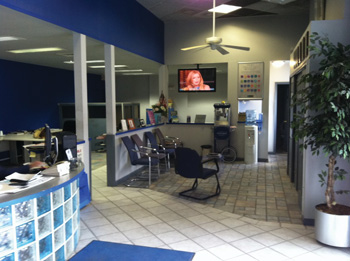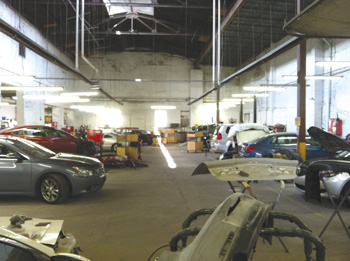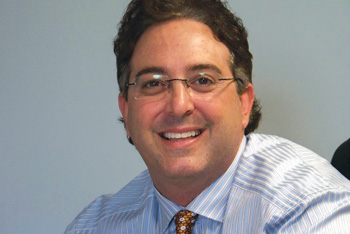Val Fichera, CEO of Collision Care Auto Body Centers, doesn’t have his official title on his business card. Instead, it reads “Lead Cheerleader” – a title that, in his opinion, better suits him.
“I just can’t stress enough how important it is to have a winning attitude,” he said.
That optimism started 19 years ago when Fichera became CEO of the Philadelphia-based company at the ripe age of 21. Known then as DeNardo Auto Body, the store was an 8,200-square-foot, nine-person establishment that was founded in 1930 by his grandfather. After taking ownership, Fichera began to dream big.
“At one time, our goal was to do $10,000 in sales,” he recalled. “I said, ‘10,000! We can make a profit!’ And now we get $300,000 a week, and we’re heading toward $500,000 in the next 18 months.”
One to Many
Since 1993, the enterprise has expanded from a single-site business to a full-fledged multiple-shop operator (MSO) with five locations in the Philadelphia area – and it’s not stopping there. Collision Care will soon open two more shops in Marlton and Mullica Hill, New Jersey. Although it’s a new state and a new environment, the expansion process is less daunting than it is exhilarating.
“We didn’t feel that the state line should prohibit us from going into New Jersey because there’s a market over there that’s just asking to be attended to,” said Lou Berman, vice president of sales. “Moving into New Jersey isn’t so much of a move as us wanting to add coverage east of the city, and from a corporate management standpoint it makes sense to have something in that area. We’re excited about it.”
Fichera shares that enthusiasm for venturing into uncharted territory. While Philadelphia boasts a solid marketplace, New Jersey is much more fragmented and somewhat disorganized. This only further stimulates Collision Care’s desire to grow.
“We feel that we can go in and do a better job for our customers [there] than what they’re currently getting,” he said. “So I look at New Jersey and I think, ‘We could really do something there.’ We consider it an opportunity.”
Location Is Everything
The first key factor in succeeding as an MSO is choosing location wisely. Berman says that Collision Care wants to “own Philadelphia,” and that can’t happen on side streets with low visibility.
“We have main road locations on well-known streets and roadways in the marketplace so that they’re easy to find,” he said. “I would say that in Philadelphia, you will not find a company like us that has the location and the parking and the amenities we have.”
Fichera adds that it’s important to closely examine the size and demographic of a market before opening a shop.
“The biggest mistake is opening a store that’s too big for a market,” says Fichera. “When we do our demographics on things like household income and accident receipts, we can do a good analysis on what we think that market should support and what size shop we would need for that particular market.”
The business’s expansion also involves taking advantage of an ever-changing marketplace. As other longtime shops went out of business and older owners retired and sold their stores, Collision Care jumped on the opportunity and sought growth.
“We really have a philosophy that there is never a middle ground,” said Berman. “Either you’re growing and improving or regressing. We’re constantly thinking about growth and reviewing our process, our procedure, our service, our personnel. It’s a wheel that just doesn’t stop spinning.”
Past and Present


What has changed the most over the years is the competition to partner with insurance carriers, according to Berman. Today, insurance carriers measure and evaluate more vehicle repair facets than they did in the ’90s, thus making DRPs more complicated.
“A lot of companies are now more engaged in fighting for a piece of the direct repair pie,” he said. “Back then, it was much easier to set yourself apart.”
Berman says that today, success is based more on connections in the industry than self-reliance. “There’s a lot more information sharing going on right now, and it’s more widespread. Back then, you weren’t getting a lot of expertise offered to you from, let’s say, vendors and owners in the industry. Now, the ability to succeed is probably more predicated on the relationships you have and those you can get to assist
you versus the knowledge that you have all by yourself.”
However, that knowledge still plays a huge role in succeeding as a business. Like any great body shop, Collision Care considers training to be of utmost importance, specifically in the area of customer service. The shop recently contracted with ContactPoint, which provides multilayered customer service training such as evaluating customer calls and updating patrons by text, e-mail and phone.
“With customer service or customer service training, there is no budget,” said Fichera. “We don’t ask our employees to come to training during after-hours. We pay to have them do it during normal business hours to make sure they can get that training in.”
Skill and Will
Fichera makes sure that his employees know how to do their jobs and that they do them well. But skill only goes so far with employees – they need to have actual passion and motivation for their work.
“In just about every training session, we ask ourselves, ‘Is it a skill issue, or a will issue?’” he said. “I would say that no employee has a will issue. And if they do, we recognize that very quickly.”
A positive work environment seems to do the trick with retaining – and gaining – employees. “I was just on my computer today and I had 20 applications. It’s unbelievable,” said Fichera. He likes to think of his employees as “internal customers” and wants to make them as happy as possible with their jobs.
“If you put them in an environment where they have the skills and the tools to do their jobs and reward them when they do a good job, they’ll stay with you for a long time,” he said.
Streamlining the Process
Knowing employee strengths and weaknesses also helps to streamline the repair process, says Berman. While some shops take on a more flexible approach with employee duties, Collision Care believes that can actually inhibit the process.
“It really makes sense to try to funnel assignments to people who excel at [certain] things than to those who don’t,” said Berman.
As an MSO with some shop acquisitions, no two Collision Care shops are laid out the same. But the inconsistency in design doesn’t necessarily hinder the process. Each store’s standard operating procedures are uniform across the board – from assembly to ordering parts. Every location has its own staff exclusively designated for making minor repairs to expedite the process.
“That kind of leans back toward certain individuals in the shop who you know have a real good knack for doing specific things,” said Berman.
The company will eventually implement formal “speed lanes” within the new Mullica Hill and Marlton store layouts to further hone repair speed.
With a Six Sigma certified upper management team, an average drivable cycle time of four days and a non-drivable cycle time of eight days, Collision Care ultimately pursues a lean model of business. Berman says that the lean process shouldn’t start when the vehicle reaches the store; rather, Collision Care’s process begins with estimate accuracy.
“It should be a complete parallel between estimate accuracy and cycle time,” he says. “The lean process starts in the beginning because that’s where we feel it’s most important.”
Catering to the Customer
Despite its transformation into an MSO, Collision Care strives to provide the same personalized service that made DeNardo’s famous. That starts with putting the customer before process and procedure, says Berman.
“We want to say, ‘Hey, there’s a lady in front of us that just had an accident and she needs some help!’ It shouldn’t matter that we don’t have the necessary component to move forward in the process. Let’s get her to a car rental, let’s smile and shake hands with her and make her feel at home. Let’s do it like in the old days and provide good, old-fashioned customer service, and just care about people.”
One way Collision Care caters to its customers is through its updated and revamped website. Berman says that a consulting company took a look at their former website and described it as a “dirty garage.” He felt that wouldn’t appeal to Collision Care’s increasingly female demographic, so they decided to spruce it up. It turns out it worked because now, customers say that the website is more inviting and friendly.
“We wanted it to be something that females could look at and say, ‘This is somewhere I can go that I can trust.’ We need to be appealing to those who patronize us. It doesn’t make sense not to.”
On the Fast Track
To further serve its customers, Collision Care has pioneered an agent
“fast track” program. Conceptualized two years ago, this program
accelerates service to individuals after they have an accident. Instead
of making customers wait for claim numbers and approvals, agents can
call Collision Care immediately. The shop, which has a team of employees
on standby for these situations, will then assist with towing, car
rentals and service questions. Not only does the program benefit
customers and agents, but it also stimulates business.
“It’s a complete service from start to finish,” said Berman. “The
customer doesn’t have to get transferred, they don’t have to speak to
anyone else. I don’t have to tell them to hold on a minute. It’s a fast
track, and that’s why we branded it and named it that way.”
Controlling the Controllable
Sometimes, parts don’t come in on time. While this factor can’t really be controlled, Collision Care focuses on the things it can control, such as customer interaction, training and marketing.
“If you don’t have the stuff in, what do you do, tell the customer to go home?” said Berman. “We’re not going to turn you away or make things difficult for you.”
Another way to maintain control is by being prepared. Collision Care’s intense safety, technical and customer service training programs assure that employees are supplied with the knowledge to do their daily jobs.
“We want to know about that newly designed vehicle and what’s going to be necessary to restore it to a factory-acceptable condition,” said Berman. “We don’t go around saying to ourselves, ‘Wow! We’re glad that worked out!’ If you’re saying that, then you need training because chances are it’s not going to work out like that every time.”
Giving Back
Sure, billboards and commercials are great. But Collision Care’s marketing strategy of giving back to the community is arguably more powerful and genuine than any TV or radio spot. The company is affiliated with Louie’s Voice, a nonprofit founded by Berman to support autistic children and their families.
“My youngest boy, Louie, is severely autistic, so Collision Care has been gracious enough to not only allow me to advocate for him and other children like him, but have chosen autism as their charity of choice,” he said.
Collision Care also sponsors a variety of other local organizations, from the Boys & Girls Club to club sports teams. “Those are our customers,” said Fichera. “If we’re going to spend money on marketing, we want to spend it on the people who are spending money in our stores.”
Into the Future
As Berman said before, Collision Care’s wheels are always spinning and will continue to do so for years to come. The goal is to have a total of 10 stores open within a tight market, and he’s constantly thinking of new possibilities to further facilitate customer service, such as interactive apps for smartphones. “Anything that’s coming out that’s new or different is something that may trigger the pulse of our customers. We’re very aggressive because we want it,” he said.













